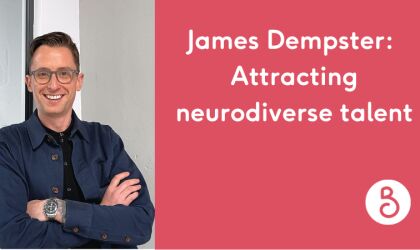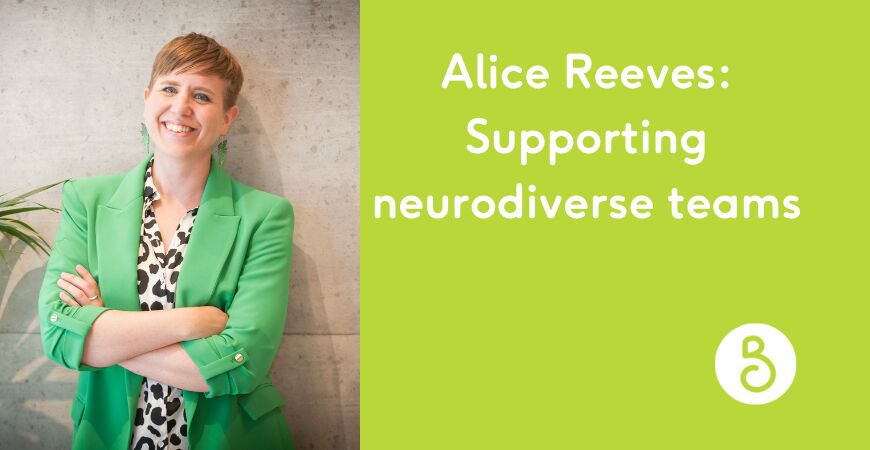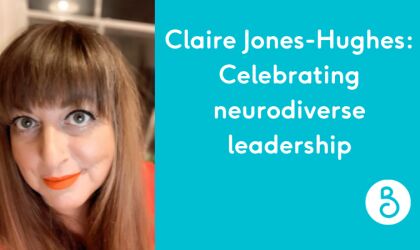

Thu 21 / 07 / 22
Celebrating neurodiversity with Alice Reeves – supporting a neurodiverse team
By Hannah Jackson of Brighton Chamber
How can you support the strengths of neurodiverse people in your team?
Next up in our series celebrating neurodiversity in business, is Alice Reeves, Co-founder of The Joyful.
Alice talks about her recent diagnosis, what challenges she can have with working relationships – and the ways she’s found of working around these challenges.
On the initial diagnosis
I was diagnosed with Combined Type ADHD in November last year, aged 35. ‘Combined’ means I have a mix of inattentive and hyperactive symptoms. Sometimes I struggle to focus on anything, whereas at other times I ‘hyperfocus’ on tasks and can easily forget to eat or drink, or miss appointments because I’ve become completely absorbed in something and shut the world out.
Challenges with working relationships
The negative side of ADHD is, of course, where the challenges lie in terms of working relationships, business processes and workplace culture. Some of the ways my ADHD causes issues in the workplace are:
- Difficulty regulating emotions. When I’m feeling anxious or frustrated, I can quickly become overwhelmed. In this space of system overload, I struggle to ‘act professionally’ in difficult situations.
- Hyperactivity. My brain works VERY fast, meaning I can get to grips with and solve complex problems extremely quickly. On the flip side, my thoughts can race ahead into multiple-scenario catastrophising at the speed of light.
- Zoning out / distractability. Mid-conversation, I can completely lose track of what’s being discussed because another thought, sound, or something in my field of vision has pulled my attention away. This can come across as being rude or disinterested, but it’s not!
- Rejection Sensitivity Dysphoria (RSD). I’m hypersensitive to criticism. This has been one of the biggest struggles in my career and has impacted all my working relationships at some point. It’s also behind my painful tendency towards perfectionism.
- Difficulties with Executive Function. ADHD impacts the everyday skills we use to function, including working memory, flexible thinking and self-control. I can forget things I’ve just been told, struggle with unexpected changes, and get frustrated quickly. I overcompensate by over-planning tasks, asking for repeated clarification, and fixating on details.
What we can do about them
If you have people in your team with ADHD and they struggle with any of these things, here are my tips for better working relationships:
- Follow up verbal instructions with written ones. If you ask them to complete a task, no matter how small, follow up with a clear, concise email to confirm exactly what’s needed and by when.
- Allow flexible working. Sometimes, it’s just impossible for people with ADHD to focus. If tasks can be completed at any point during a day or week, this makes it easier to flex responsibilities with focus and motivation.
- Spread out deadlines and support with prioritising. Many people with ADHD won’t find the motivation to complete a task until it’s urgent. Spreading deadlines throughout the month and supporting them to prioritise their task list can help with time management.
- Use automation tools to reduce admin workload. For example, our team uses Calendly to allow people to book meetings directly into our diaries. Our booking links are in our email signatures, which avoids back-and-forth emails to arrange or re-arrange meetings.
- Be patient and compassionate. It can be difficult to understand the motivations and reactions of people with ADHD and other neurodiversities. And it can be tough to be on the receiving end of overloads, breakdowns and outbursts. Being patient when you need to re-explain or clarify things, giving space for people to be upset and frustrated, and understanding that everyday stuff might be more difficult for some people to manage than others will go a long way – and it will be immensely appreciated.
The benefits of working with someone like me
Throughout my career, I’ve been called unprofessional, too emotional, difficult and disrespectful. I’ve also been called exceptional, brilliant, a superstar and a genius – my ADHD brain definitely has its benefits and without it, I wouldn’t be where I am now.
Alice Reeves is Co-founder of The Joyful.
As part of our series celebrating neurodiversity in the workplace, we spoke to James Demspter, MD of Fox&Bear, and Claire Jones-Hughes, Partner at Contentim. Read their stories, insights and advice below:
If you want to contribute to the Chamber blog, contact us on hannah@brightonchamber.co.uk



